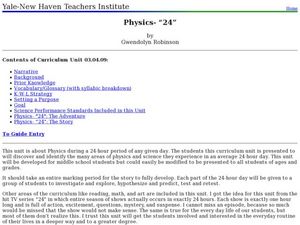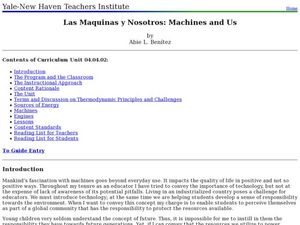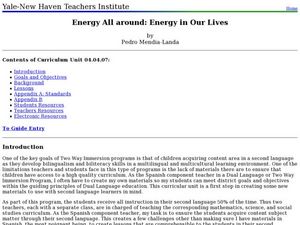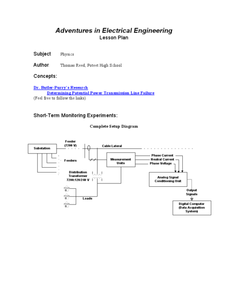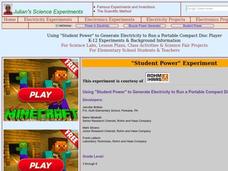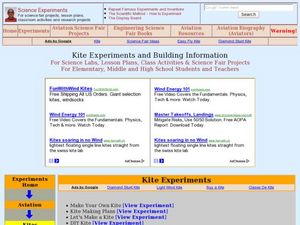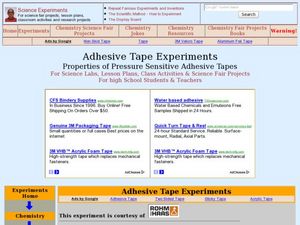Curated OER
The Physics of Sound: How We Produce Sounds
First graders construct a KWL chart on sound. In this physics instructional activity, 1st graders describe different ways to produce sound. They explain how sound waves propagate.
Curated OER
Physics and Me
Sixth graders compare and contrast mass and weight. For this physics lesson, 6th graders calculate speed given distance and time information. They construct a rocket and relate this to Newton's 3rd Law of motion.
Curated OER
The Physics of Cell Phones
Students explain how cell phones work. In this physics lesson, students describe the advantages and advantages of having one. They identify the different parts of a cell phone.
Curated OER
Physics "24"
Students construct a model house or school. In this physics lesson plan, students research about who wind up clocks work and write an essay about it. They determine the center of gravity of different objects.
Curated OER
Las Maquinas y Nosotros: Machines and Us
Second graders explain the relationship between energy and work. In this technology lesson, 2nd graders describe the different uses of machines in their everyday lives. They record observations and data in their science journal.
Curated OER
Energy All Around: Energy in Our Lives
Students identify the different sources of energy. In this energy lesson plan, students list different machines and identify the type of energy used to operate them. They create a diagram of a wind turbine and label its parts.
Curated OER
Physics of Sound: How We Hear Sounds
Second graders identify the different function and parts of the ear. In this physics lesson, 2nd graders explain how we hear sound. They read about the life of Helen Keller and respond to questions that follow.
Curated OER
Science in Focus: Force and Motion
Learners explore force and motion through a series of experiments. In this physics lesson, students create and interpret speed graphs. They build an electromagnet and explain the factors affecting its strength.
Curated OER
Diffraction of Laser Light, Polarization and Color Filters
Students investigate light behavior by conducting a series of experiments. In this physics lesson plan, students calculate the wavelength of the light source using an equation. They determine what color is produced when light of...
Curated OER
Trajectory and Range of a Projectile
Students investigate the factors affecting projectile trajectory. In this physics lesson, students calculate the range, time and speed of projectiles using mathematical equations.
Curated OER
Build Your Own Hovercraft
Learners construct a hovercraft following specific procedures. In this technology lesson, students explain the physics principles behind hovercraft. They compare and contrast this machine with the aircraft.
Curated OER
Homopolar Motor Experiments
Students construct a homopolar motor following certain procedures. In this physics lesson, students explain how generators and motors work. They compare and contrast the characteristics of both.
Curated OER
Density
Students determine the density of different substances. In this physical science instructional activity, students rank them according to their density. They discover the relationship between volume and density.
Curated OER
Thermo and Fluid Dynamics of a Homemade "Lava Lamp"
Students construct their own lava lamp using simple substances. In this physics lesson, students explain how difference in density causes convection. They solve for forces and buoyancy using mathematical equations.
Curated OER
Adventures in Electrical Engineering
Students explore electricity by conducting a series of experiments. In this physics lesson, students discover the relationship between current, voltage and resistance. They calculate voltage and power in a given system.
Curated OER
Using "Student Power" to Generate Electricity to Run a Portable Compact Disc Player
Students explain the relationship between magnetism and electricity. For this physics lesson, students describe the transformation of energy. They create an electromagnet and investigate the factors affecting its strength.
Curated OER
Aviation, Aeronautics and Aerodynamics
Students investigate the physics of flight through various experiments. In this physics instructional activity, students construct different flying objects. They explain the dynamics that make these object fly.
Curated OER
Motion: Speed, Velocity, Acceleration and Networking
Students interpret a variety of motion graphs. In this physics lesson, students calculate the speed and acceleration of objects using numerical data from graphs. They apply what they have learned to solve real world problems.
Curated OER
Electromagnetic Radiation
Students explore the nature of electromagnetic spectrum through a series of experiments. In this physics lesson, students determine how light behaves under certain circumstances. They explain how humans perceive colors.
Curated OER
Stepper Motor
Students compare a stepper motor from a traditional motor. In this physics lesson, students summarize how it works. They build their own stepper motor and explore its uses.
Curated OER
Triboelectric Series
Learners conduct a series of experiments on static electricity. In this physics lesson, students arrange explain how objects become electrically charges. They predict which objects will become charged when rubbed together based on the...
Curated OER
Kite Experiments and Building Information
Students build their own kite following certain procedures. In this physics lesson, students explain the aerodynamics concepts involved in flying kites. They trace the development of aviation.
Curated OER
Build Your Own Submarine
Students construct their own submarine following a certain procedure. In this physics lesson plan, students calculate the density of objects using a mathematical formula. They explain why some object floats in water while some do not.
Curated OER
"Stick to It!" Properties of Pressure Sensitive Adhesive Tapes
Students investigate the strength of different adhesives. For this physical science lesson, students compare the force needed to peel adhesive tapes from a surface. They analyze collected data and make a generalization.





